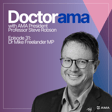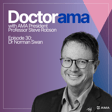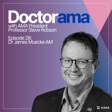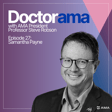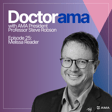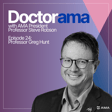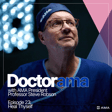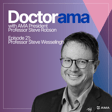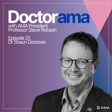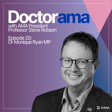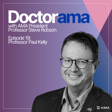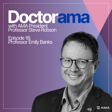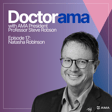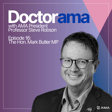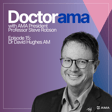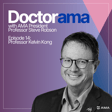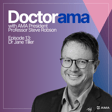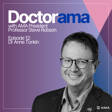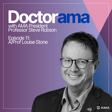Become a Creator today!Start creating today - Share your story with the world!
Start for free
00:00:00
00:00:01

Episode 29 - Dr Michael Wright
In episode 29 of Doctorama AMA President Professor Steve Robson chats with Dr Michael Wright.
Recommended
Transcript
The Current State of General Practice in Australia
00:00:00
Speaker
General practice has been the linchpin of healthcare in Australia since before all of us were born. And it's so familiar to us that often we don't even spend a lot of time thinking about it. But it's become clear that many Australians have trouble accessing healthcare care that they can afford when they need it. And that has huge ramifications for the health sector. When I was a medical student, the preferred career option for most medical students was general practice, but that's changed. Well, with all of this going on, are there things that we can do?
Exploring Solutions with Experts
00:00:33
Speaker
I think there are, and I'm going to be looking into the crystal ball today with someone who really knows, on Dr Rama.
00:00:43
Speaker
You're listening to Dr Rama with Steve Robson, bringing you the best of health, medicine and people. Well, I'm delighted to say that my guest today on Dr Rama is one of Australia's most prominent general practitioners, Dr Michael Wright. Michael, welcome to Dr Rama. Hi, Steve. It's great to be
Dr. Wright's Journey and Perspectives
00:01:00
Speaker
with you. Michael, I think we're going to find out on the podcast that you have a very interesting story and you and I have something in common as well that we'll talk about in a little while. But I'd really love to know a little bit about your background and how you came to be a general practitioner. What was it that made you make that choice? Thanks, Steve. um My dad was a GP, so I'm a second generation general practitioner. Dad was a GP in country Victoria before he and mum moved to Queensland.
00:01:28
Speaker
and then As I was growing up, I actually got to see a lot of general practice because dad had a bit of a cancer scare. Mum in her wisdom said to him, do you want to work from home for a little while while you recuperate? It took her eight years to get him back to the office. But during that time, I would come home from school and a couple of rooms at the house were for the patients. And I got to experience life growing up with these familiar faces who I would often see regularly in the waiting room. And I got to really value and see the value on a daily basis of what this long-term relationship with someone who knew them, someone who knew a patient's medical history, um and what it meant for them and someone who actually cared for them. And I suppose that's the trigger for me and that got me started.
00:02:18
Speaker
Yeah, I think a lot of us of our ah vintage, dare I say, had that experience of the family doctor who knew the whole family. Where in Queensland were you living at this time? I grew up on the Gold Coast, which was she quite a beautiful place at that point. um And look i so I still have some happy memories there. look and And I worked with Dad there for a few years until, unfortunately, he passed away. And I think then that's kind of when I took a bit of a stock take and thought, starting to recognise I think that other bits of the health system probably weren't valuing general practice as much as I thought my patients were. um And I suppose that's kind of where my journey then started.
Advocating for General Practice: Policy and Economics
00:03:02
Speaker
So I guess having that such a close-up experience with general practice in your own family, that obviously fired you up and made you think, wow, general practice is is the career for me.
00:03:13
Speaker
Yet totally, Steve, um it was amazing having that experience. and And increasingly, I just felt that others in the health system, whether they be policymakers, health funders, even our other medical colleagues, weren't recognizing the value and the importance of that um comprehensive, high quality longitudinal care that general practice provides. So Michael, you and I have something in common, and listeners and may not be aware that we both have degrees in economics, although yours is a lot better than mine. what What drove you to do that? Because you're obviously a busy general practitioner, but you've taken on a PhD in economics. Tell me a little bit about ah the decision making, the process and where that has landed you.
00:03:58
Speaker
Yeah, Steve, look, I think after I started thinking about this more broadly, I'd go and talk to policymakers and talk about how I thought general practice was a great profession and how it should be better funded. And I suppose a couple of times I got the response of, well, you would say that you're a GP. What's your evidence for that? What are the numbers behind it? And I suppose that got me recognising that if We were going to influence policymakers and funders. I needed to understand their language. And so that got me started on this journey of health economics. So I went to the public health degree and which had a health economics major. And I was fortunate enough to do that in the UK and also spent some time working in the NHS. So that gave me some perspectives around that.
00:04:44
Speaker
And then I came back to Australia and as you mentioned, I did a PhD in health economics. So looking at the value of continuity of care in general practice and trying to provide a financial metric to that beyond the sense that we all have that it's a good thing. So Michael, the journey to the UK and your experience of working in the UK, what differences, what similarities were there between the way you had practiced as a general practitioner here in Australia and in the UK?
Comparative Insights: UK vs Australia
00:05:13
Speaker
Yeah, i look, I worked in a couple of settings. So I worked in a private practice, um which was predominantly for people who worked in the city of London. So a lot of um office workers, because the UK system means that you have to be registered with a single practice. And so often people were challenged that that practice would be near their home, and then they didn't have access elsewhere. So that was a privately funded service, which worked quite well.
00:05:40
Speaker
But then I spent some time working in the NHS and in the sort of National Health Service um as a salaried doctor there. um And I have to say, it was you know at a first point, it was very hard work. It made me... I'd actually say it probably tested my clinical skills a lot because there were a lot less access to resources that I was used to in Australia. And I think that's probably the fundamental thing that I noticed. I yeah just recognized that there was really not a lot of support for the GP. You were just sitting in a room, getting people coming through. The problem that I found is that even though patients were registered with a practice, so they had continuity with a practice, there didn't seem to be much support for continuity with an individual GP. So what would happen is I'd order some tests for a patient.
00:06:32
Speaker
someone else would check those tests and then potentially a third person would see the patient for a follow-up and I've got this feeling of I'm not quite sure if that's how continuity of care works. um yeah i suppose yeah And there are a couple of, I suppose, my reflections. The other reflection was it was it was very difficult to get an appointment, that there was a triage system, which often was based on whether a patient could call the phone within the first two minutes of the practice opening, because that's when all the appointments let went. um So if the patient got through then, they'd get an appointment, otherwise the practice was full. And I thought, you know, that's not the access and continuity of care that I was used to. um And so then I came back to Australia.
00:07:15
Speaker
so Michael, you and I both know that the language of economics takes a little while to get used to.
Funding Challenges and Opportunities
00:07:21
Speaker
How did you feel the difference was between the work you're doing in your health economics PhD and the clinical work? what What was that sort of intellectual difference between the two for you? I think it is like learning a ah new language. um I would talk about patients having better care. But from a health economist, they'd say, well, is that cost effective? And um so it's not just looking at, does the patient have better care? But what's been the cost of that care? And is it better than what they would have gotten if they hadn't have got that care? And so it's quite logical, but just different terminology. yeah um And I suppose the difference is, clinicians, we often talk about you know fees and payments, but then in economics, we talk more about incentives. But it's all similar.
00:08:07
Speaker
things it's just as i say learning a language that then meant that I could then go and talk to funders and policymakers, and they would understand what I was trying to say. Yeah, that literacy is really quite an important thing when you're speaking to bureaucrats and and other funders. Michael, you have a very important role with Avant Mutual at the moment as the chief medical officer, and that is a role that's very wide ranging. But Avant and the other indemnifiers deal with people when they are under stress.
00:08:38
Speaker
what i guess What have your experiences and and learnings been in the role with Avant and advising them on how to support doctors? What are the big things that have really ah struck a chord with you? yeah steve so I've been with Avant for about three years now as their Chief Medical Officer and I had a unit which is called Advocacy Education and Research. So I'm not in court, if you know what I mean, dealing with medical legal, but I'm really trying to understand what are the issues that doctors are facing. So we try and help doctors when they do have troubles, like when they get complaints or when they have claims, we really support them. But also it's trying to, the main role that
00:09:16
Speaker
my team and I have is trying to help doctors navigate our increasingly complex health system. So whether it be how to deal with a complaint if you get one, as well as how to avoid them. So kind of increasing literacy in both of those. like One of the things that we've tried to do is we look at where doctors are having problems within the health profession. So um in areas as diverse as looking at these new real-time prescription monitoring services where doctors are getting inadvertently picked up for not understanding these systems. The complexity of Medicare has been something that we've looked at a lot and tried to work with
00:09:53
Speaker
the health department and other um policymakers to say look this system could be simpler and it should be simpler and if it was simpler it would be easier for us to do our jobs. What we've heard is that over the last couple of decades general practice has become a much less attractive um career destination for recently graduated doctors. And Australians themselves have had increasing issues in access and and affordability of general practice, yet it's very efficient and the linchpin of care.
00:10:26
Speaker
What do you think, Michael, are the key issues that are facing general practice at the moment? And before I tackle what we can potentially do about them, you know are there things that you know should we be optimistic about the future of general practice? um steve I'm an optimist, so I think I will ah um move on to some optimism. But I think if I think back about what's happened and how did we get here, I think particularly over the last decade, we've seen a shift in the focus of the health system and health funding away from general practice back towards the hospital system.
00:11:01
Speaker
And it's been at a time despite we've been hearing that we're going to strengthen Medicare and improve primary care and general practice. But if you look at the figures, we can see that over the last decade, around a decade ago, about 7% of total health expenditure went to GPs and practice services. Now that's dropped to less than 6%, so it's now got a five in front of it. um and And if you look at the most recent stats, you can see that We are pouring more money into hospitals and the increase in expenditure in hospitals, not the total amount, but just the increase in hospital expenditure is approaching to the total amount that we spend on GP services. So let me be clear.
00:11:44
Speaker
The additional amount of funding that's been poured into our public hospitals is the same quantum as the total amount spent on general practice in Australia. It's getting there. Yeah, it's nearly there. And and and I think it's it's happened without us realising it. I mean, we know that over the last couple of years, ah increasingly, GPs have said, look, we can't afford to just use the Medicare rebate. We need to increase the amount of pocket cost. And that has certainly been a safety net for a lot of practices. But but that's not a solution across the whole country. There are many areas where um patients aren't able to afford those costs. So if I think about what we need to do about it, I think we need more funding and more flexible funding into general practice services.
00:12:31
Speaker
What some countries are doing is they're sort of setting a benchmark and saying, we think 10% of the health budget needs to go to comprehensive, coordinated, high quality longitudinal care, like the care that's in general practices and Aboriginal community controlled health organisations. So we can set targets or benchmarks for that. I think that's something we could definitely start working towards. And we need to stop this drop in the funding that's going to GP services. We need to have some more flexible funding. So and with most of the MBS, the only bit of time that is billable to the MBS is the time when I'm physically sitting in front of a patient. and So the time that my practice team spend with a patient, that's not billable. And the time that I don't spend in front of patients, so the time coordinating the care with my team, looking at who might need to be recalled for care, none of that non-patient
00:13:29
Speaker
time is funded within and the MBS and I feel that that's the major major flaw in it that we need to change. I've always thought it's very short-sighted because we see headlines around the country all the time about emergency department pressures, ambulance ramping, waiting lists, overcrowded public hospitals. But a proportion of that is potentially preventable with great primary care and particularly really good quality general practice and general practice being resourced. Is that your sense of things? As an economist, does it make sense at the moment to allow that expensive sector like hospitals
00:14:05
Speaker
be overwhelmed when the more efficient sector like general practice is under resourced? Absolutely not. I mean, that's what we see is that if you better fund primary care services, you do eventually lead to downstream cost savings. The challenge we've had in Australia is we've tried to introduce a few pilots and from the healthcare homes trial to the diabetes care pilot, which have showed that if you invest more care in general practice services, you will get some better care, but it doesn't save costs downstream in the short term. It needs a longer term investment. And unfortunately, that's what we've never managed to do.
00:14:45
Speaker
but I think this is yeah yeah absolutely this is one of the big issues that governments tend to look at the next budget cycle and it's really difficult to look at the five to ten year horizon for these things but as as your own research has shown that's actually when it really pays off and the the cost benefit shows up. Michael, young, recently graduated doctors are turning away from training as general practitioners. What advice have you got for a recently graduated ah doctor who's who's thinking about their career options and considering general practice? Look, I can say that it is a great career. I love the diversity of patients who I see. I love the flexibility that it gives me. It has allowed me through my whole career to continue in general practice while also learn additional skills and come back to it. But I recognize there are these real problems and these problems around funding. And I think more generally around the workforce support for GPs in generally.
00:15:46
Speaker
And then finally, I suppose it's a bit about respect and value that I do think we need to improve the funding. We need to remove the disparities that people get as they come from being a medical student to being a junior doctor, to being a GP registrar, to being a GP fellow. Each step of those way, there are financial barriers for those doctors who choose to continue in general practice. So I think the first step is correcting those as well as then providing more longer term support to the GP workforce and then getting the message out that as i said that it is a great career it is really rewarding and it needs to be better rewarded financially.
00:16:27
Speaker
in order, but it's not just about money. Michael, you're in the wonderful position with the event role of traveling around and speaking to lots of doctors.
Innovation and Resilience in General Practice
00:16:35
Speaker
When you speak to your general practice colleagues, do you get a sense of optimism at the moment? And if not, what are you saying to them when you meet them? Yeah, I think it varies. I think we've seen particularly during the pandemic, the burden of pressure that has gone on to our general practice colleagues. But then I think about how well we adapted to provide telehealth. We provided the majority of the vaccines during the during. So I feel like.
00:17:03
Speaker
GPs are able to adapt and have been proven really resilient, but I think we do need to get some more optimism. I mean, I think one of the areas I see that's potentially exciting is GPs being
AI in General Practice: Pros and Cons
00:17:15
Speaker
able to embrace innovation, including you know we've there is the potential for some of these AI tools to help us write consultation notes. Now we've got to do things like that safely, but you know there is real um opportunity there for general practice to lead the system. As I've said, we can see that the funding of the system has gone back towards hospitals and that needs to change. And once we do do that, I think GPs should be the heart of the health system and we can get back to being that. But we need governments, policymakers, and as as I mentioned, our colleagues to support us to do it.
00:17:54
Speaker
Yeah, absolutely. I think another whole conversation with you is around the role of artificial intelligence. And I think we're all seeing at the moment the scribes and things that will listen to a consultation. So I want to put get you to put your event hat on at the moment with these rapid changes. And if I'm, for example, seeing a patient, I use a scribe and and the AI captures the essence of the consultation. That's opportunity but are there risks there are you picking up any kind of risks and things that we should be anxious about yes i think we have to enter these things cautiously when you hear the i think facebook sold motto used to be move fast and break things now,
00:18:36
Speaker
As doctors, we know that if we don't certainly don't want to break things with um our patients. So we kind of view everything through a quality and safety lens, I might say, and certainly with my van head on, we would support that wholeheartedly. But there are, you know, there were it's important that doctors understand regulations in terms of, you know, there are rules around privacy principles, there are laws around recording consultations. we do need to know even before we start using these things. And then if we do start using them, you've got to know what is being recorded, how it's working, where the data is being kept. So there's lots of considerations. And then I suppose finally is about the the accuracy in that you know these large language models are trying to predict what comes next. And so
00:19:29
Speaker
Like an example might be if I had a ah template for writing someone a contraceptive prescription, I might ask them about sexually transmitted infections. the AI might expect that to be in the concert might actually add something in the consultation note about sexually transmitted infect, which didn't happen. And so that's why it's really important to look at the output and also understand that the output might change every time. So that's the, you know, this model is learning. And so it's something to assist you, but it's not taking over your decision making.
00:20:02
Speaker
but I suppose another analogy is, ah I was going to say, it's a bit like, yeah you know, when you start in the hospital and you see the ECG interpretation and everyone's having an inferior infact. Now, you know that they're not, you know, but when you first start, you don't know that. And then it's only with your clinical judgment, along with the output that you get the full value. And I see AIs a bit like that, that it's not going to take over the decision making, it's potentially a support, but we really have to be cautious that what it's giving us might not be steering us in the wrong direction as well. Michael, just in the same way that artificial intelligence looks to the future and tries to predict, that's something I know. We've known each other for a long time and I know that you do that as well. It's extraordinary to hear
00:20:49
Speaker
from someone who is steeped from their own family in general practice who has practiced in australia and overseas who has that additional funding experience of of a deep understanding of economics and the extraordinary experience you must have working with an indemnifier to work with doctors. I'm so pleased that somebody with all of these um experiences and hats on is optimistic about the future of general
Optimism for the Future of General Practice
00:21:19
Speaker
practice. so look My final question to you, if we look into the crystal ball, if you and I look into the crystal ball, Michael, do you see a good future for general practice from where we sit at the moment?
00:21:29
Speaker
Steve, I am forever the optimist, so I will say yes. i'm very I am very concerned about the direction, ah particularly with the speed at which funding is disappearing. I am really concerned, but that's why it's important that we get these messages out now and see some real attempts to stop the drop. and to allow our patients to continue to have comprehensive care. I mean, for the Medicare's now in its 40th year and for the majority of that, most Australians have just been able to go and see a GP had the benefit of having that comprehensive, high quality care. And that's given Australia some of the best health outcomes in the world.
00:22:11
Speaker
And I am concerned that if we don't turn the ship around and get that funding continuing to support primary care services, that our health system is going to go the wrong way. But I remain optimistic that we can do it and that we have the evidence of how to do it. like we We know that we should be able to work better in multidisciplinary teams. We know we can increase the quality of the care that we provide, but it's going to take the whole system. It's not just GPs who need to change. It's actually the funding and the health system's focus. Mike, with all of these hats on, it's extraordinary you managed to find the time to talk to me today. We speak a lot and I'm really hoping we can speak again in the future. There's lots to talk about, but I want to thank you so much for taking the time to talk to me today on Dr Rama. Thanks, Steve.
00:23:05
Speaker
You've been listening to Dr Rama, a podcast produced on Ngunnawal country by the Australian Medical Association. All rights reserved.
